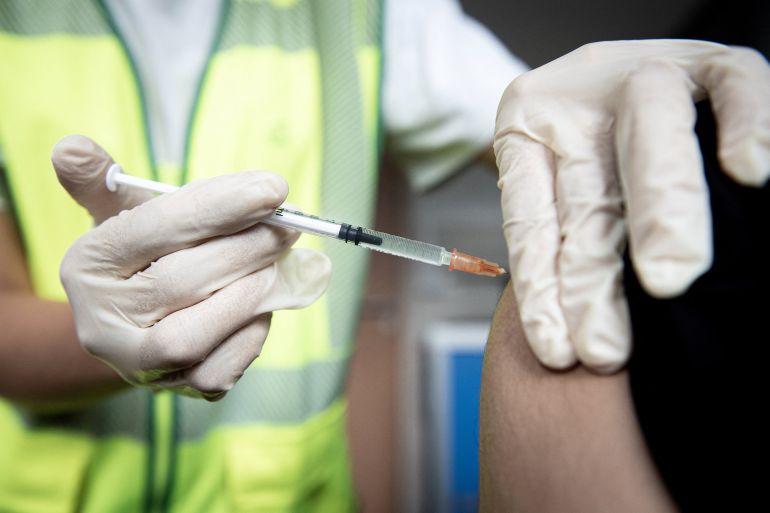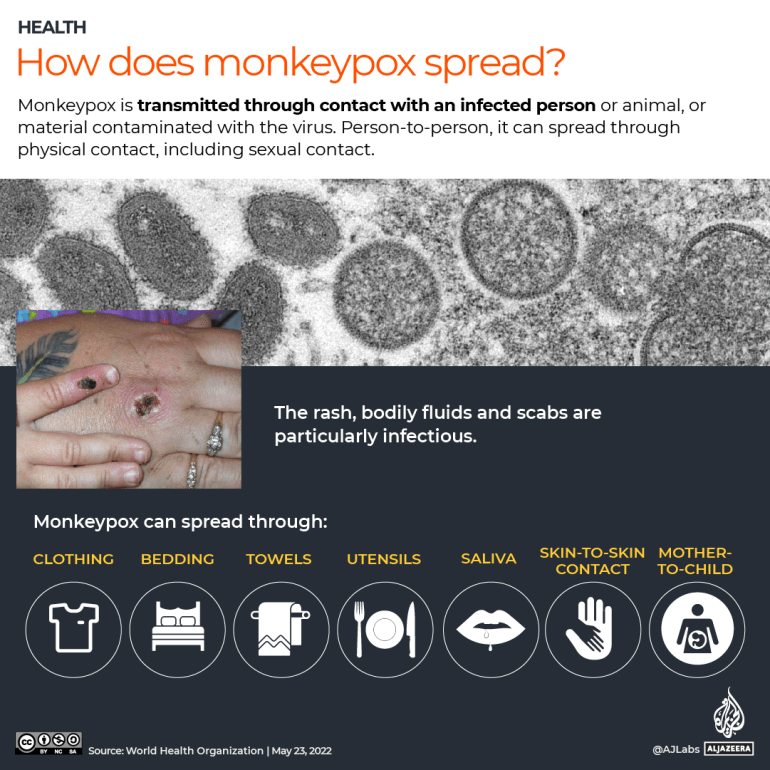WHO to use ‘mpox’ instead of monkeypox to avoid stigma, racism
Both names will be used simultaneously for one year while ‘monkeypox’ is phased out, the UN health agency says.

The World Health Organization (WHO) says it will start using “mpox”, a new preferred term for monkeypox, in a bid to avoid racism and stigmatisation stemming from the existing name.
The United Nations has previously criticised some news coverage about the virus, warning that poor journalism can “reinforce homophobic and racist stereotypes and exacerbate stigma”.
Keep reading
list of 3 itemsUS to add 1.8 million doses to monkeypox vaccine supply
WHO asks public for help with monkeypox name change
The disease was first discovered in humans in 1970 in the Democratic Republic of the Congo, with the spread among humans since then mainly limited to certain West and Central African nations.
A surge in monkeypox infections has been reported since early May mostly among men who have sex with other men, outside the African countries where it has long been endemic.
The UN has suggested limiting the number of sexual partners a person has to decrease the risk of transmission. While men who have sex with men have been disproportionately likely to be affected, public officials have stressed that anybody can contract monkeypox.
But in May, cases of the disease, which causes fever, muscular aches and large boil-like skin lesions, began spreading rapidly around the world.
The WHO declared the spread of monkeypox a public health emergency of international concern (PHEIC), the global health organisation’s highest level of alert, on July 23.
“When the outbreak of monkeypox expanded earlier this year, racist and stigmatising language online, in other settings and some communities was observed and reported to WHO,” the UN health agency said on Monday.
The WHO launched a public consultation process to find a new name for the disease earlier this year and received more than 200 proposals.
One of the more popular public suggestions was “mpox” or “Mpox”, put forward by men’s health organisation REZO, among others. Its director said at the time that the removal of monkey imagery helped people take the health emergency seriously.
“Following a series of consultations with global experts, WHO will begin using a new preferred term ‘mpox’ as a synonym for monkeypox. Both names will be used simultaneously for one year while ‘monkeypox’ is phased out.”

The United States, which was among the countries and bodies supporting the name change, welcomed the announcement.
“We must do all we can to break down barriers to public health, and reducing stigma associated with the disease is one critical step in our work to end mpox,” said US Health and Human Services Secretary Xavier Becerra.
The WHO has a mandate to assign new names to existing diseases under the International Classification of Diseases.
Generally, it seeks to avoid associating any disease or virus with a country, region, animal or ethnic group.
Last year, it assigned the letters of the Greek alphabet to new coronavirus variants to stop the practice of linking them with specific countries.
Considerations include scientific appropriateness, pronounceability, and usability in different languages.
“WHO will adopt the term mpox in its communications, and encourages others to follow these recommendations, to minimise any ongoing negative impact of the current name,” it said.
The one-year transition is to avoid confusion caused by changing the name in the midst of a global outbreak.
Some 81,107 confirmed cases and 55 deaths have been reported to the WHO this year, from 110 countries.
Where the given dataset was known, 97 percent were men, with a median age of 34 years old; 85 percent identified as men who had sex with men, according to the WHO’s case dashboard.
The 10 most affected countries globally are: the United States (29,001), Brazil (9,905), Spain (7,405), France (4,107), Colombia (3,803), Britain (3,720), Germany (3,672), Peru (3,444), Mexico (3,292), and Canada (1,449). They account for 86 percent of the global number of cases.